- Home
- Jim Fergus
Strongheart: The Lost Journals of May Dodd and Molly McGill Page 2
Strongheart: The Lost Journals of May Dodd and Molly McGill Read online
Page 2
“I don’t sign releases,” I said, “we do business the old way, with our word. But then again, everyone knows that the white man’s word is shit. Why else did you come here?”
“I don’t know … I’m not exactly sure myself … maybe I came looking for the ghost of my father. I thought I might find it here. He left me so unexpectedly, and I have things I need to talk to him about. This seemed to be the right place to do that. I have wonderful memories of our summers out here.”
“I thought you didn’t believe in ghosts?”
“I’m speaking metaphorically.”
“Why else did you come?”
“I see where the pages are torn out of the last ledger book you left with me. It ends suddenly. I’d like to know the rest of the story, and publish it in its entirety.”
“I don’t know if that’s possible yet, JW.”
“Why not?”
“Because the rest of the journals hold sacred tribal secrets, and, in case you haven’t noticed, you’re a white man. Everything your people have touched that once belonged to us, you have stolen or destroyed, and what little is left, we have to protect.”
“You have white blood yourself, don’t you, Molly? You’re descended from one of the authors of these journals. Which, by the way, were also written by white people.”
“Yes, but they are white women who became Cheyenne, and some of them lived with us for the rest of their lives … and afterward, as well. They had our babies and were accepted as tribal members.”
“What does that mean, afterward?”
“It’s a metaphor, JW,” I said.
“Haha. But, as you know, Molly, I, too, am related to one of the journals’ authors, which is why your people let my father have them in the first place. It seems to me that you and I should share a certain ownership. Who knows, we might even be related somewhere down the line. We should run that by one of the genealogy websites.”
“Your father proved his good intentions toward us,” I said. “You have not yet done so, JW. You haven’t even been back here in over twenty years.”
“And what would that involve for me to prove myself?”
“Do you like my scent?” I asked.
“What?
“Do you like my scent?”
“I have no idea,” he said. “What does that have to do with anything?”
“I know white people find such a thing strange, but in the old days we lived much closer to the animal world than you. All of our senses were more keenly developed, because you lived outside of nature, tried to suppress and control it, rather than living within it. You know, we always hated the way white people smelled. When we went on raids against the wagon trains that were moving through our country during the California gold rush, we used to tie the shirts and dresses we stole to poles and ride with them for a couple of days, letting them blow in the wind. It was a kind of primitive dry cleaning to air out the stink. You must have noticed in reading Molly McGill’s journals that she was very attracted to the way Hawk smelled … remember? She said it was because he had a kind of wild scent. That excited her, and it was one of the reasons she fell in love with him.”
“Yes, and as you well know, Hawk’s mother was a white woman, so he, too, was half white by blood. How is it that he smelled so wild?”
“Because, as you yourself know from reading the journals, his mother, Heóvá’é’ke, Yellow Hair Woman, had been taken by the tribe as a little girl, and she, too, soon became all Cheyenne, and that washed the stink off her.”
Now I stood and moved in front of JW. I leaned down and put my hand on the back of his head, and pulled his face against my neck. “There. Take a good deep breath of me.”
I released him. “So, do you like my scent?”
He was clearly flustered, his face flushed, and he babbled on for a moment, admitting that, yes, he did like my scent, in fact, he liked it a great deal.
I leaned down again and put my nose against his neck, nuzzling it while taking a good whiff myself.
“If I’d known you were going to do that, I would have taken a shower,” said JW, after he had recovered.
“And put deodorant on, right? That would only have disguised your natural scent.”
“Well, did I pass?”
“Not so bad … for a white man. I could possibly get used to it.”
“High praise, indeed,” he said.
“I am Molly and Hawk’s great-great-great-great-great granddaughter,” I said. “At least I think that’s the correct number of generations. Most of my white blood has been well diluted by now, but perhaps I inherited some women’s version of Hawk’s scent, or of Molly’s, or a combination of the two; these attributes I believe are passed down like eye and hair color. By all accounts they had wonderful chemistry together. I wanted to find out if there might be anything like that between us.”
“Really? Don’t tell me you’re thinking about breeding with a white man.”
“In your dreams, white boy. Tell me, JW, why have you never married, or had children?” I asked. “Are you gay?”
He shook his head.
“Impotent or sterile?”
“I was married, Molly, but my wife and I had no children,” he answered. “She died very young of cancer. Speaking of scents, and chemistry, the last year or so of her life she no longer smelled like herself, but of the chemo drugs that had pervaded her body. After her death, I had to throw out all the clothes she wore during that time in order not to be reminded more than I already was. She was a fine woman.”
“I’m sorry. I’m sure she was. Forgive me.”
“And you?” he asked. “As long as we’re getting personal. Did you marry and have children?”
“No.”
“Why not? I’m sure you’ve had many suitors.”
“I had other business to attend to.”
“Such as?”
“You remember the Strongheart women’s warrior society you read about in Meggie’s and Molly’s journals?”
“Don’t tell me that’s still in existence.”
“Of course, it is. At least a modern version of it. Though now we simply call ourselves Konahe’hesta, the Stronghearts.”
“And who do you war against in this twenty-first century?”
“I am not allowed to speak about that to nonmembers of our society. Suffice it to say that we war against crime and injustice committed by both individuals and organizations, but particularly against women and children, and there we find plenty of enemies. I will tell you this much: after the Custer battle at the Little Bighorn, a band splintered off from Little Wolf and Dull Knife and went their own way, with their own mission. This included a number of the white women about whom you read in the journals, as well as a number of Cheyenne and Arapaho, men and women. Eventually this band became a small tribe of their own, and lived in a world of their own. They never surrendered to the U.S. government.”
“What do you mean, ‘a world of their own’? Where did they go? Where did they live? How did they survive? What happened to them? And why during all my dad’s and my research have I never heard of them before?”
“I can’t answer any of those questions for you, at least not now. If I choose someday to show you the rest of the journals, you will be able to read about it.”
“And the descendants of the original Strongheart society still live in this world you speak of?”
“Yes, some of them do. I live there … part of the time. It’s one reason I’m not enrolled as a tribal member on the res.”
“One reason? You mean, in addition to the fact that you’re listed as having died in 1997?”
“Well, sure, there is that, too, which makes for a convenient misapprehension.”
“I’m confused … is this some kind of mythic world you’ve created in your imagination, Molly? Or maybe it’s a virtual world, like a video game? Is that what you’re trying to tell me? Maybe that’s what you do for a living?”
“You ask a lot of questions, JW.�
�
“It’s my job.”
“No, it is a very real world,” I said. “I come and go between here and there.”
JW looked at me then with an expression of concern and confusion. “Since you won’t answer my questions, or give me any details,” he said, “I don’t know what you’re talking about, Molly. But something about the way you just said that made the hair on the back of my neck stand up. Who are you, really? The last time you came to me, you spoke of being a shape-shifter, and now you talk of different worlds? What do you want from me? Why are we here together, right now?”
“Ah, yet more questions, JW. You came looking for me, remember? You still want to take me to the movies. You wanted to return the journals, but what you really want is to know how the story ends. That is a typically linear white-man point of view, a straight line from beginning to end. Our culture sees the world as being circular, elliptical … at least it did traditionally … a place where stories, like life and death, have no end, but rather intersect and bleed into other stories, other lives and deaths, in that way continuing indefinitely, and often ambiguously. If you’ve ever listened to a real Cheyenne storyteller, or an ancient storyteller of the Caucasian steppes, from whose people we are descended, you would know this. To most whites his or her stories might make little sense, and/or have multiple interpretations. Perhaps they have no real beginning or ending, but our people understand them perfectly.”
“So you’re a scholar as well as a shape-shifter, Molly,” said JW, “or perhaps an anthropologist? And possibly even a time traveler if you’ve heard stories told by an ancient storyteller of Caucasia.”
I stood now. “You know, JW, we Stronghearts, like our forebears, the Scythian Amazones, take our sexual pleasure when and with whom we wish. And we are very selective in our choices. To be frank, I was thinking possibly of spending the night with you. I like you, and have ever since we were kids … even though you’re a white boy. And I know you like me, too. That’s why I wanted to see how we reacted to each other’s scents. But I’m going to leave you now, and take these saddlebags with me.” I lifted the bags off the hook where they were hanging by the door of the trailer. “You can do what you want with the copies you made, publish them in your little magazine if you want. But I’m going to tell our story my way, and it’s not the rest of the story, either, which implies an ending. It’s simply a continuation of the story, another bend in the long trail. I’ll be in touch. I’ll find you when the time is right. Don’t you worry about that.”
ADDENDUM TO THE INTRODUCTION
Roughly three weeks after our first encounter on the res, the second serial installment of what JW Dodd had titled The Journals of Meggie Kelly and Molly McGill began to run weekly in Chitown magazine. Even though he stayed true to his stated intention in the prologue of using a light editorial hand on the journals, he allowed himself a good deal of fictional license in the epilogue, and especially the prologue. His most egregious falsity was the implication that I had spent the night with him in his trailer on my first visit there. He was clearly engaging in a sort of white man literary fantasy—seducing the Indian warrior woman—yet another form of subjugation and dominance. To set the record straight, in the preceding pages, I have recorded exactly what transpired between JW and me, which is an ever-evolving story.
In addition to quoting other historical source material, here and there, I have also taken the liberty of adding contemporary commentary of my own between some of the actual journal excerpts. As an Indian woman, I have, of course, full license to do so, whereas this would be forbidden to JW Dodd, due to obvious prohibitions against cultural appropriation.
We begin in the following pages with those that JW referenced as having been torn out of the last journal I left with him in Chicago … the beginning of the rest of the story.
–MSB
LEDGER BOOK XIII
{begun by Margaret Kelly, continued by Lady Ann Hall, continued by Molly McGill}
The undated letter below appeared on the last page of Lady Ann Hall’s journal entries.
Molly dear,
I do not know what precisely has occurred here today. I have considered the matter over and over again, from all possible angles, and the only firm conclusion at which I have been able to arrive, and surely the most important, is that in my last brief glimpse of you, you were quite alive, riding behind Phemie on her magnificent white stallion, with Pretty Nose upon her paint, galloping along beside you. You were smiling at me as you passed by on the ridge, and you cried out: “I told you, Ann, in my dream, I always fly!”
Just prior to this moment I witnessed you on the ridge, arms spread and letting yourself fall, if not precisely jump, into the abyss, when somehow Phemie and Pretty Nose seemed to appear out of nowhere, and Phemie swept you up off the ridge and onto the back of her horse as if you were a rag doll. The problem here, of course, is that neither the soldiers, nor Gertie, nor the others in our group, with the possible exception of Martha (who refused to discuss the matter with me) … none of them saw you rescued. They all saw you fall from the cliff, and were beside themselves with horror and grief, and, in the case of the soldiers, astonishment that you had actually gone through with it.
The question is, how does one reconcile these two quite unreconcilable versions of events? I have always prided myself on being a logical woman, Molly, for whom all occurrences on earth have a reasonable explanation, even if science has not quite gotten round to sussing out all the details of the how and why. My late, dear companion, Helen Flight, viewed the world quite differently than I, due perhaps to her flighty artistic nature. For instance, I believe I told you that she and I spent a good deal of time on safari in Africa, where we intermingled with our splendid native guides of the Masai tribe. These people, like our Indian friends, are a superstitious lot, who believe that among their people are certain seers, prophets, soothsayers, mystics, shape-shifters, clairvoyants—call them what you will—who possess various supernatural powers. They believe, as well, in a remarkable array of strange deities, ghosts, and sorcerers, some good, some bad, who come and go among the living from time to time, either wreaking havoc or performing miracles, depending on their persuasion. In short, they believe in magic as surely as they believe in their own noses. To be sure, the Masai tales of such matters, told around the evening campfire, were enormously entertaining—that I do not for a moment dispute. And Helen seemed far more receptive to the notion that there might be some basis of truth in what the natives recounted. Indeed, I have been told by a number of the Cheyenne that, based on the testimony of certain warriors, she actually came to believe, as, of course, did they, that the artwork she painted upon their bodies and upon their war ponies really did serve to protect them from harm in battle. Let us be perfectly frank, Molly, for you, too, strike me as a logical woman, all of this nonsense is just that—utter poppycock. Paint does not stop bullets. Which, of course, does not explain your … I know of no other word to describe it … miraculous … escape, which I must say challenges my own logical nature to its core. Yes, on that score, I remain completely flummoxed, and I begin to doubt my own eyes and sanity.
You will presumably have already learned before you read this that having satisfied the initial purpose of my trip here, i.e., to discover what became of my Helen, I have decided that my time in these troubled plains is over. Thus, I am taking advantage of the escort offered by the soldiers who were charged with delivering you to Medicine Bow station, in order to catch the train there myself, as the first stage of a long trip back to England. Although she expressed her desire to return to her Cheyenne husband, I have insisted that little Hannah accompany me. I arrived here in the company of my maidservant, and I intend to leave in that manner as well. I refuse to abandon her to what I think you will agree is an extremely uncertain future, nor is she constitutionally equipped, in either body or spirit, to endure the impending dangers you surely face.
I leave this ledger book with Martha to deliver to you. Despite m
y initial irritation at not having been chosen as our merry band’s “fearless leader,” please know, Molly, of the extremely high esteem in which I hold you. You are a strong, brave woman, who has endured more hardship, heartbreak, and trials than any one person deserves. Not only couldn’t I blame you for having leapt from the cliff, as horrified and devastated as I was, when … at first … I thought you had … I also admired your courage, and completely understood your decision. That you have apparently, at least from my eyes, been rescued by … let us just say … the fates, whatever those may be, brings me great joy, and even hope that perhaps you can help to lead the others to some safe haven. If any can do that, I believe it is the triumvirate formed by you, Phemie, and Pretty Nose (and don’t you dare tell those Irish scamps that I said so!), three of the strongest, most courageous, and capable women it has ever been my honor to know. Perhaps to serve in that role, is, after all, why you were spared.
Good luck to you, Molly.
I sign this letter with love in my heart for you and all of our dear friends, and please do pass that sentiment on to the others.
I am, yours, respectfully,
Lady Ann Hall of Sunderland
THE LOST JOURNALS OF MOLLY McGILL
The Glory of War
The images come to me both day and night, both waking and asleep. One minute I am riding in the air on the back of a giant raptor, my arms holding on to its broad neck, my naked body stretched across its back, my face buried in its soft, warm, pungent feathers that hold a scent exactly like the skin of the man, Hawk … and I am aroused. The next moment, I am simply riding across these plains on my mare, Spring, surrounded by my friends. Truly, I fear that I am going mad.
—from the lost journals of Molly McGill
(undated entry) at the battlefield of the Little Bighorn
I do not know what day it is or how I got here. The last thing I remember clearly is hearing Ann Hall scream, No, please, Molly, don’t! and the liberating sensation of falling. As I fall, I set my wings and soar like a raptor on the wind, free from this earth at last. It is the recurring dream I have had for most of my life. Now I wake up in this tipi, with Martha hovering over me, plucked thus abruptly from my dream. “Ah dear, Molly,” she says, “welcome back to us. How soundly you have slept and for nearly twenty-four hours. I have been looking after you, as you once looked after me.”

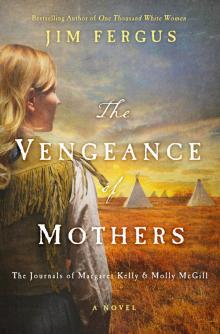 La Vengeance des mères
La Vengeance des mères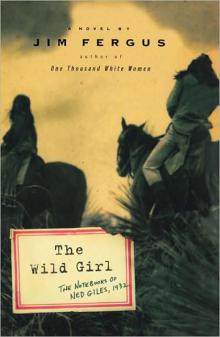 The Wild Girl: The Notebooks of Ned Giles, 1932
The Wild Girl: The Notebooks of Ned Giles, 1932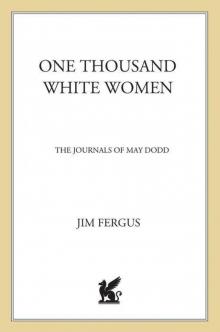 One Thousand White Women
One Thousand White Women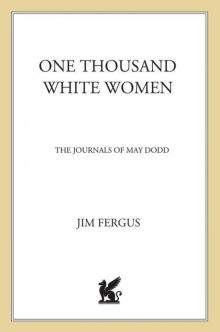 One Thousand White Women: The Journals of May Dodd
One Thousand White Women: The Journals of May Dodd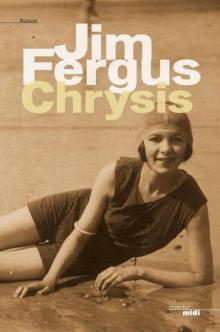 Chrysis
Chrysis Strongheart: The Lost Journals of May Dodd and Molly McGill
Strongheart: The Lost Journals of May Dodd and Molly McGill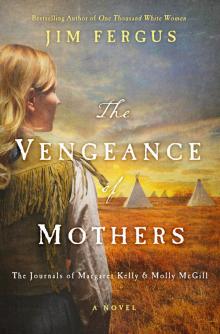 The Vengeance of Mothers
The Vengeance of Mothers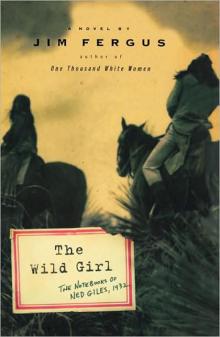 The Wild Girl
The Wild Girl